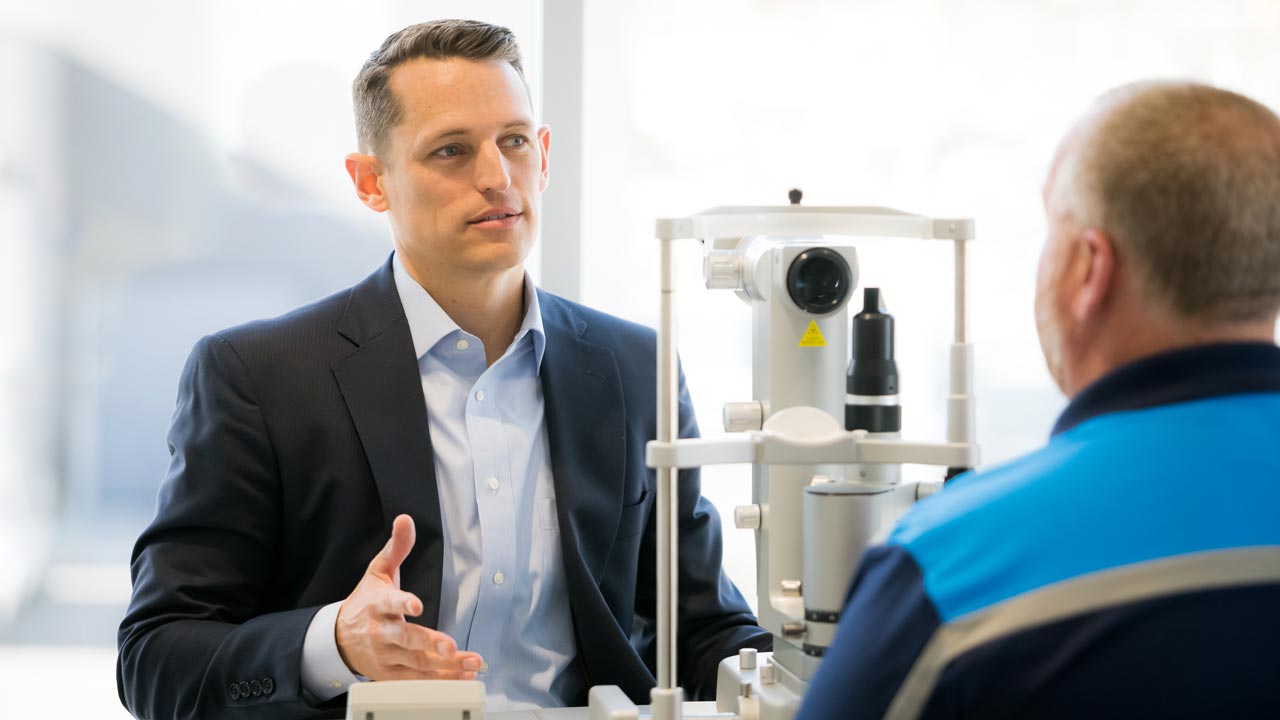PRK Utah
What is PRK?
PRK is a type of refractive surgery that is essentially laser eye surgery like LASIK but without a corneal flap. During photorefractive keratectomy (PRK), an excimer laser is used to reshape your cornea. And like LASIK surgery, you will enjoy phenomenal visual results, giving you freedom from contact lenses and glasses. The only trade-off with LASIK is the visual recovery of PRK surgery is slightly longer.
“I had PRK Surgery. The change in my life has been incredible. I can see so much clearer!”
Top reasons to choose Waite Vision for PRK.
01
You’ll enjoy the benefits of your PRK procedure for years to come.
02
Our PRK pricing is all-inclusive, with no upsells or extra charges for astigmatism, high prescriptions, enhancements within the first year, or eye medications.
03
You won’t have to worry about picking up your prescription eye drops and recovery meds. We’ll have everything here for you.
04
05
You will consult directly with our doctors to discuss your best vision plan, and meet Dr. Waite, a highly skilled refractive surgeon.
06
When you arrive, you become the center of attention.
07
You receive a comprehensive, personalized, diagnostic evaluation of your eyes during your PRK consultation.
08
PRK takes only a few minutes start to finish, and your vision recovers quickly afterwards.
09
Your PRK procedure is performed with the most advanced technology available today.
10
Is PRK safer than LASIK?
Both refractive surgery procedures are safe. Photorefractive keratectomy (PRK) is better suited for certain types of eyes. PRK surgery can correct refractive error as well as eye conditions that cannot be addressed by LASIK. Dr. Aaron Waite, often recommends PRK refractive surgery to patients who have thin corneas, irregular scarring, keratoconus and have already had crosslinking performed. Unlike LASIK surgery, there is no corneal flap with photorefractive keratectomy. Call our office and schedule your consultation to see if you are an ideal candidate for PRK.
“PRK is another favorite and successful vision correction surgery. It is better suited to people with a tendency for dry eye or with thin corneas.”
PRK Utah
How it works.
During photorefractive keratectomy, a thin layer of the surface of your corneal tissue will be gently removed by your eye surgeon. An excimer laser will then reshape your cornea, according to specific calculations. Within seconds, small laser pulses will correct any refractive errors. A protective bandage contact lens is placed on each eye to provide you with added comfort during your healing process.

It starts with a PRK consult.
The cost of a consultation is $150, because we do more than a quick “PRK screening.” Your initial consultation includes a full diagnostic workup using seven different tests and the latest technology. You’ll then sit down personally with our doctors and discuss the perfect vision correction procedure tailored specifically for you along with other valuable information regarding the health of your eyes. You’ll also be able to meet Dr. Waite, your surgeon. Your $150 investment then goes towards your vision correction surgery.
How much does PRK Eye Surgery cost?
Your PRK investment with Waite Vision is $2850 per eye, or $5700 for both eyes. We are the only Utah practice to publish its real PRK price. Think of it this way: After PRK you’ll “own” your vision instead of “renting” it from the contacts or eye glass industry. When you invest in vision correction you are investing in yourself.

How much are glasses and contacts costing you?
The average person spends $25,000+ on glasses, contact lenses, solution, eye exams, etc. It’s like renting your vision from the glasses and contacts lenses industry. Worst of all, these will NEVER correct your vision. Use our affordability calculator and see how much you can save by getting PRK.
Select your age
18
Eyeglasses bought in a year
0
Price of eyeglasses
0
Contact lens boxes bought in a year
0
Price of contact lenses per box
0
Lifetime cost of visual aids
Vision correction is only
$5,700
THINKING OF YOU
The elegant simplicity of Waite Vision.
Waite Vision is a work of art — featuring crisp, clean lines, and abundant natural lighting with a stunning, third-floor view of the Wasatch Mountains. The moment you enter our reception area, you’ll experience the difference of Waite Vision.
PRK questions? We've got answers.
Does insurance cover PRK?
No. PRK is a vision correction procedure that has a lot in common with LASIK. One of those commonalities is being considered an elective procedure. However, you are able to use your HSA or FSA for the procedure.
Does PRK wear off?
No. If you are age 47 or older, your eyes might change as a result of aging. This occurs whether you’ve had PRK or not. If you are around this age, Dr. Waite will take that into consideration when determining the best vision correction options for you.
Does PRK hurt?
No. You will be given numbing drops so you will not feel discomfort during your PRK procedure. We’ll take care to ensure you’re feeling relaxed and comfortable. The visual recovery after PRK does takes slightly longer than LASIK.
How long does PRK take?
PRK takes only a few minutes per eye. A solution is used to gently remove the corneal epithelium so the excimer laser can correct any refractive errors.
What if I blink or move during PRK?
There is no need to be concerned. Our lasers are designed to limit and account for movements. Even if you were to cough, the laser will pause and resume exactly where it left off.
Who is a candidate for PRK?
PRK is an excellent procedure if you have thin corneas with nearsightedness (myopia), farsightedness (hyperopia), or astigmatism and would like improved vision. A detailed eye exam is needed to assess if PRK is right for you.
Is PRK a safe alternative to LASIK?
Yes. Both procedures are safe and allow you to achieve incredible visual results. Overall, it is a great alternative for people with thinner corneas, corneal scarring or keratoconus after crosslinking.
When can I return to work after PRK?
Most of our PRK patients are back to work within 2 days after surgery and have a relatively short recovery time. The vision itself is usually clear within the next day, and blurry vision continues to clear even more over the weeks.
Can I Use My HSA or FSA for PRK?
Yes. PRK is a Health Savings Account or Flexible Spending Account procedure. If your company offers a health or flexible spending account you can use it to pay for PRK.
Take the next step towards clearer vision.
Don’t delay — now is the right time. You’ve got one life, live it with visual freedom. Our patients always ask why they waited so long to enjoy clear, crisp vision. Read what they have to say…
Book a Consult Now
Available Appointments
Waite Vision
3333 N, Digital Dr #300, Lehi, UT 84043
801-876-6000
We collect eyeglass frames from previous vision correction patients and distribute them to people in developing nations worldwide.
Complete Evaluation
2 hours • $150
This small investment goes towards your vision correction procedure. This visit is our most comprehensive eye exam.
When
Let's donate your unneeded eyeglass frames to people in developing nations.